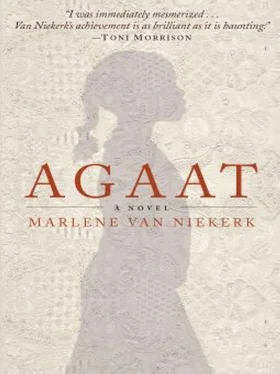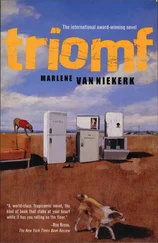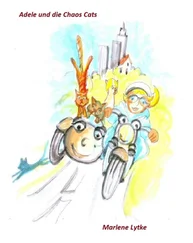I cannot look at it, I cannot look at it for one minute longer. Hound! Fucking low hound!
Surabaya Johnny. You pretended not to see her.
The barn was murky. Somebody had unscrewed most of the yellow bulbs that Jak had had fitted round the walls. The place smelt of sweat and liquor and stale perfume. On the bales of hay couples were sitting and smooching. Most of those standing on the sidelines were young girls on the prowl and married women making use of the evening to feel some other body under their hands. The dancers were moving in a track along the sides of the barn. The music was too fast, there was something frenetic about the movements of those who could keep up, while the less fleet of foot fell about, bumping into one another and stepping on one another’s toes.
You heard swearing, fuck out of our way here, look where you’re damn-well stepping, man.
At the back of the barn the band blared on. In the dim light the musicians plucked and slapped their guitars. The drummer bullied the other instruments.
You noticed Riekert Meyers amongst the dancers. He was giving his own performance in the middle of the floor with a young blonde woman whom you didn’t know. Riekert spun the girl from his fingertips, first this side round then the other and he pulled her close into him and danced up behind her, with his hands low over her stomach and his hips against her buttocks. You could see on the woman’s face what was happening. The sly sulk, the spite, the satiated vanity that the Meyers brothers induced in all their concubines. He had a sweet little smile on his heart-shaped face. The band was playing for him. A hot little number, as it was known.
You were the first to hear what Corrie Meyers was screaming. She barged smilingly into the dancers and screamed into their faces.
As if it were their foreheads that were on fire.
As if the flames were in her own mouth.
You were outside in an instant. The hay barn was a mass of flame. Smoke and flames were pouring out of ventilation holes and the open door. Through the chink you could catch a glimpse of the inferno inside. It was August and the new lucerne hay was gassy, there were wheat-straw bales with which the stables were kept dry. Behind you the dancers were starting to cluster together with the sluggish reactions of people who have drunk too much. The people came out of the tent and pointed. Nobody did a thing.
The plane was circling about the yard. Will that be enough to satisfy Jakkie now? you thought.
Was that when Agaat appeared? In her black-and-white there in the clearing before the blazing barn? The one to whom all looked, the one who turned round, lifted her good hand for silence, and started issuing orders left and right: You and you and you do this that and the other!
The woodshed and the onion store and the petrol tanks and diesel storage first! she called. Wet the ground all around!
The ordinary garden hoses wouldn’t reach far enough, you knew.
She was the one who remembered the water cart in which water was transported for the cattle in summer, which ever since the last fire you’d always kept filled with water.
Get out the tractor, hitch the water cart, wet the ground first around the fuel tanks, she commanded. She had a bale of wheat-sacks dragged out of the barn.
Untie them! Wet them! Bring them! Jump! she bellowed.
Where’s Jak? you called. Somebody shouted that he was still over at the landing strip.
Agaat sent for the long ladders under the lean-to. She had the young men clamber up, she had the wet sacks draped over the tanks. The men responded to her commands as if she were a general.
Dawid was blundering about and looking wildly around him. Him she sent to the pump-house at the dam to switch on the pump. The pump served the garden irrigation, if it was switched on, at least the house would be safe.
But she thought up something else. She knew where the irrigation pipes ran in shallow trenches in the garden, and she knew where the pipes ran above-ground. She gathered a team of the hired waiters and the kitchen maids and showed them where they had to dig up the pipes. In line they dragged up onto the yard length upon length of black irrigation pipe with spray-heads and laid them around the outbuildings. Here and there a connection had to be made.
Agaat took the orange connectors and the knives and the clamps and the screwdrivers out of her apron pockets. Everybody stood staring amazed at the plan. Then she went and against the side wall of the house she turned the handle across to open the valve.
Lift the pipe! Hold the heads! Lift them, hold them, aim for the roofs! All together, one, two, three! Agaat shouted.
Arms akimbo, she watched her plan being put into effect. Every water-point was manned by somebody holding the hammer of the spray-head so that the jet could shoot up thick and high. In an instant the gutters of all the buildings were gushing with water. Gradually the soil of the yard grew dark and slippery.
The corrugated-iron sheeting of the roof of the hay barn started popping off from the heat with the cold water on top. There were loud reports and blows as the plates shot out and fell to the ground. Long tongues of fire licked out and a rain of sparks mizzled on everything.
The men were instructed to get the implements out of the big barn and to park them at a safe distance. Tractors and combines and valuable pieces of smaller machinery and supplies of paraffin and oil. Wet sacks were thrown over everything. Everywhere people were running around with buckets of water as commanded by Agaat. The spray-heads were directed at the gaping holes in the roof of the hay barn and you could hear the hissing as the water hit the flames. Thick clouds of steam billowed out of the roof.
You saw Agaat talking to Jakkie.
A fine time to get here! Don’t you hide yourself now! Fill with water, five empty molasses drums, you, she told him. Screw off the caps and roll them in through the door of the hay barn so that we can get right in under the fire with the water.
It was over as abruptly as it had started. Within an hour the hay barn was a black smoking shell. The people were standing around the yard in little groups, shocked sober, their clothes stained with mud and soot.
Where were Jak and Jakkie? You looked around, but you couldn’t see them among the assembled. Agaat struck the ploughshare. When everybody had assembled under the wild almond, she looked at you.
You thanked the people for their assistance and their presence at the feast.
I am sorry, you said, that it had to end like this.
Some of the older people came to look for Agaat with you to shake her hand, but she’d disappeared. She didn’t sleep in her room that night.
The next morning Jakkie was gone.
You heard doors slam in the night, were aware of car headlights sweeping over the yard, voices, but you were too heavy with your medication to get up. You thought you were dreaming. Did you hear the sideboard opening, tchick? closing, tchick? When you woke up, at ten o’clock the next morning, black scraps of burnt paper were swirling past the glazed stoep-door in front of your room.
You went to the kitchen. Jak was standing in front of Agaat. You pushed past him. She was holding one hand in the other. You went to Jakkie’s room. His suitcase was gone. His bed hadn’t been slept in.
First came the military police and then the security branch.
They questioned you and Jak about your political views. About what you knew of Jakkie’s attitude to politics, his feelings about the Angolan war and about his movements the last few months.
You both said that he’d always been only positive and correct and enthusiastic about his career in the Air Force.
They wouldn’t answer any of your questions.
Читать дальше












